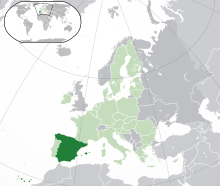LGBTQ rights in Spain | |
|---|---|
 Location of Spain (dark green) – in Europe (light green & dark grey) | |
| Status | Legal from 1822 to 1928, from 1932 to 1954 and since 1979, age of consent equalized |
| Gender identity | Transgender persons allowed to change legal gender without prior sex reassignment surgery and sterilisation |
| Military | LGBT people allowed to serve |
| Discrimination protections | Sexual orientation and gender identity protections |
| Family rights | |
| Recognition of relationships | Same-sex marriage since 2005 |
| Adoption | Full adoption rights since 2005 |
Lesbian, gay, bisexual, transgender, and queer (LGBTQ) rights in Spain rank among the highest in the world, having undergone significant advancements within recent decades.[1][2] Among ancient Romans in Spain, sexual interaction between men was viewed as commonplace,[3] but a law against homosexuality was promulgated by Christian emperors Constantius II and Constans, and Roman moral norms underwent significant changes leading up to the 4th century. Laws against sodomy were later established during the legislative period. They were first repealed from the Spanish Code in 1822, but changed again along with societal attitudes towards homosexuality during the Spanish Civil War and Francisco Franco's regime.[4]
Throughout the late-20th century, the rights of the LGBTQ community received more awareness and same-sex sexual activity became legal once again in 1979 with an equal age of consent to heterosexual intercourse. After recognising unregistered cohabitation between same-sex couples countrywide and registered partnerships in certain cities and communities since 1998 and 2003, Spain legalised both same-sex marriage and adoption rights for same-sex couples in 2005. Transgender individuals can change their legal gender without the need for sex reassignment surgery or sterilisation. Discrimination in employment regarding sexual orientation has been banned nationwide since 1995. A broader law prohibiting discrimination based on sexual orientation and gender identity in employment and provision of goods and services nationwide was passed in 2022. LGBT people are allowed to serve in the military and MSMs can donate blood since 2005.
Spain has been recognised as one of the most culturally liberal and LGBT-friendly countries in the world and LGBT culture has had a significant role in Spanish literature, music, cinema and other forms of entertainment as well as social issues and politics. Public opinion on homosexuality is noted by pollsters as being overwhelmingly positive, with a study conducted by the Pew Research Center in 2013 indicating that more than 88 percent of Spanish citizens accepted homosexuality, making it the most LGBT-friendly of the 39 countries polled. LGBT visibility has also increased in several layers of society such as the Guardia Civil, army, judicial, and clergy. However, in other areas such as sports, the LGBT community remains marginalised.[5] Spanish film directors such as Pedro Almodóvar have increased awareness regarding LGBT tolerance in Spain among international audiences. In 2007, Madrid hosted the annual Europride celebration and hosted WorldPride in 2017. The cities of Barcelona and Madrid also have a reputation as two of the most LGBT-friendly cities in the world.[6] Gran Canaria is also known worldwide as an LGBT tourist destination.[7]
- ^ Staff (1 January 2023). "LGBT Equality Index: The Most LGBT-Friendly Countries in the World". Equaldex. Retrieved 6 March 2023.
- ^ "The 203 Worst (& Safest) Countries for LGBTQ+ Travel in 2023". Asher & Lyric. 5 June 2023. Retrieved 20 August 2023.
- ^ Cite error: The named reference
glbtq romawas invoked but never defined (see the help page). - ^ Melero Salvador, Alejandro (2008). Placeres Ocultos: Gays y lesbianas en el cine Español de la Trancisión (in Spanish) (1st ed.). Spain: Notorious Ediciones. pp. 18–37. ISBN 9788493714888.
- ^ "Spain's first openly gay referee quits due to homophobic abuse". 11 May 2016.
- ^ "Top 10 Gay Cities in the World". www.ucityguides.com.
- ^ "Lonely Planet Gran Canaria". Archived from the original on 1 July 2018. Retrieved 15 March 2018.